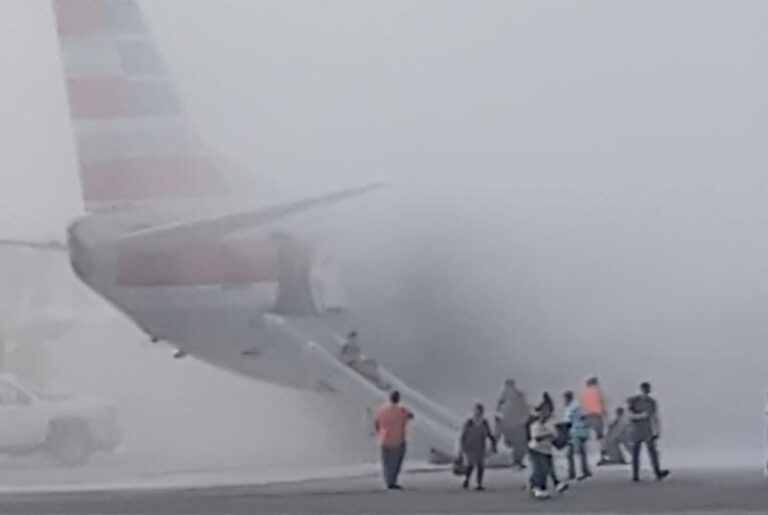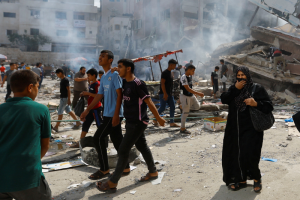Gaza death toll reaches 770 with 4,000 woundedToll from attacks in Israel rises to 900Fiercest air strikes in 75-year history of conflictU.N. says 180,000 made homeless in Gaza
JERUSALEM/GAZA — Israel pounded the Gaza Strip on Tuesday with the fiercest air strikes in the 75-year history of its conflict with the Palestinians, razing whole districts to dust despite a Hamas threat to execute a captive for each home hit.
Israel has vowed “mighty revenge” since Islamist gunmen rampaged through its towns, leaving streets strewn with bodies in by far the deadliest attack in its history.
It has called up hundreds of thousands of reservists and placed Gaza, crowded home to 2.3 million people, under total siege.
Israeli media said deaths from Saturday’s Hamas attacks had reached 900, mostly civilians gunned down in homes, on streets or at a desert dance party, dwarfing past modern attacks by Islamists except 9/11.
Scores of Israelis and some foreigners were taken to Gaza as hostages. Some were paraded through the streets.
Gaza’s health ministry said Israel‘s retaliatory strikes had killed at least 770 people and wounded more than 4,000. The air strikes, already the heaviest ever, intensified on Tuesday night, shaking the ground and pouring columns of smoke and flames into the morning sky.
The United Nations said more than 180,000 Gazans had been made homeless, many huddling on streets or in schools. Bombardment shut roads to emergency crews.
At the morgue in Gaza’s Khan Younis hospital, bodies were laid on the ground on stretchers with names written on their bellies. Medics called for relatives to pick up bodies quickly because there was no more space for the dead.
There were heavy casualties in a former municipal building struck while being used as an emergency shelter.
“There is an extraordinary number of martyrs, people are still under the rubble, some friends are either martyrs or wounded,” said Ala Abu Tair, 35, who had sought shelter there with his family after fleeing Abassan Al-Kabira near the border. “No place is safe in Gaza, as you see they hit everywhere.”
Radwan Abu al-Kass, a boxing instructor and father of three, said he had been one of the last to evacuate his five-storey building in the Al Rimal district after the area came under attack. He finally left when a missile hit the building, which was destroyed by a bigger strike after he got out.
“The whole district was just erased,” he said.
Three Gaza journalists were killed when an Israeli missile hit a building while they were outside reporting, bringing the number of journalists killed to six. U.N. High Commissioner for Human Rights Volker Turk said civilians had been harmed in strikes on tower blocks, schools and U.N. buildings.
“International humanitarian law is clear: the obligation to take constant care to spare the civilian population and civilian objects remains applicable throughout the attacks,” he said.
Trail of blood
In Israel, there has still been no complete official count of the dead and missing from Saturday’s attacks. In the southern town of Be’eri, where more than 100 bodies have been retrieved, volunteers in yellow vests and face masks solemnly carried the dead out of homes on stretchers.
A long, wide trail of blood wound along the floor of a house where bodies had been dragged out to the street from a bloodsoaked kitchen strewn with overturned furniture.
“The thing I want the most is to wake up from this nightmare,” said Elad Hakim, a survivor from a music festival where Hamas had killed 260 partygoers at dawn. “Everything was so amazing, the best party I’ve been to in my life, until it… from paradise to hell, in one second.”
Israel‘s next move could be a ground offensive into the Gaza Strip, territory it abandoned in 2005 and has kept under blockade since Hamas took power there in 2007. The total siege it announced on Monday would block even food and fuel from reaching the strip.
Israel also struck the border gate inside the sole crossing from Gaza into Egypt. Hours earlier it had advised Gazans to flee to Egypt, only to issue a swift clarification to say the crossing was closed.
Hamas operatives had “nowhere to hide in Gaza”, Israeli military spokesperson Rear Admiral Daniel Hagari said. “We will reach them everywhere.”
Israel was caught so completely off guard by Saturday’s attack that it took more than two days to finally seal off the multi-billion dollar high-tech barrier wall, meant to have been impenetrable.
Military spokesperson Hagari said early on Tuesday there had been no new infiltrations from Gaza since the previous day.
Israeli leaders will now have to decide whether to constrain their retaliation to safeguard the hostages. Hamas spokesperson Abu Ubaida issued the threat on Monday to kill one Israeli captive for every Israeli bombing of a civilian house without warning – and to broadcast the killing.
Saturday’s attacks and Israel‘s retaliation tore up the plans of diplomats in the Middle East at a crucial juncture when Israel was on the verge of reaching an agreement to normalise relations with the richest Arab power, Saudi Arabia.
Western countries have strongly backed Israel. Arab cities have seen street demonstrations in support of the Palestinians. Iran, Hamas’s patron, celebrated the attacks but denied playing a direct role in them.
“We kiss the hands of those who planned the attack on the Zionist regime,” Supreme Leader Ali Khamenei, said in a televised speech wearing a Palestinian scarf, though he said accusations Tehran was behind it were false.
A deadly clash on Israel‘s northern border on Monday raised fears of a second front in the war, with Iran’s other main ally in the area, Lebanon’s Hezbollah movement, being drawn into the fray. It said it was not behind any incursion into Israel.
– Reporting by Emily Rose, Maayan Lubell and Ari Rabinovitch in Jerusalem, Nidal al-Mughrabi in Gaza and Ammar Anwar in Sderot; Additional reporting by Henriette Chacar and Dan Williams in Jerusalem, Ali Sawafta in Ramallah and Steven Scheer in Modiin, and Washington bureau; Writing by Peter Graff; Editing by Alexander Smith and Andrew Cawthorne


















